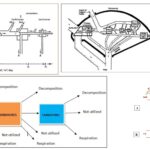IGCSE Biology 14 Views 1 Answers
Sourav PanLv 9November 15, 2024
Describe a diploid nucleus as a nucleus containing two sets of chromosomes
Describe a diploid nucleus as a nucleus containing two sets of chromosomes
Please login to save the post
Please login to submit an answer.
Sourav PanLv 9May 15, 2025
A diploid nucleus is defined as a nucleus that contains two complete sets of chromosomes. This configuration is fundamental to the genetic makeup of most somatic (body) cells in multicellular organisms.
Key Characteristics of a Diploid Nucleus
- Two Sets of Chromosomes:
- In a diploid nucleus, chromosomes are organized into pairs, with one set inherited from each parent. In humans, this results in a total of 46 chromosomes, comprising 23 pairs.
- Homologous Chromosomes:
- Each pair of chromosomes consists of homologous chromosomes, which carry the same genes but may have different alleles (variations of a gene). For example, one chromosome in a pair might carry an allele for brown eyes, while the other might carry an allele for blue eyes.
- Contrast with Haploid Nucleus:
- A diploid nucleus differs from a haploid nucleus, which contains only one set of chromosomes (e.g., 23 chromosomes in human gametes). The diploid state is essential for maintaining genetic stability across generations.
- Cell Division:
- Diploid cells undergo mitosis for growth and repair, resulting in two identical daughter cells, each with the same diploid chromosome number. During sexual reproduction, diploid cells undergo meiosis, a specialized form of cell division that reduces the chromosome number by half to produce haploid gametes (sperm and eggs).
- Genetic Variation:
- The presence of two sets of chromosomes allows for genetic diversity through recombination during meiosis. This process can lead to new combinations of alleles, contributing to variation within a population.
0
0 likes
- Share on Facebook
- Share on Twitter
- Share on LinkedIn
0 found this helpful out of 0 votes
Helpful: 0%
Helpful: 0%
Was this page helpful?




